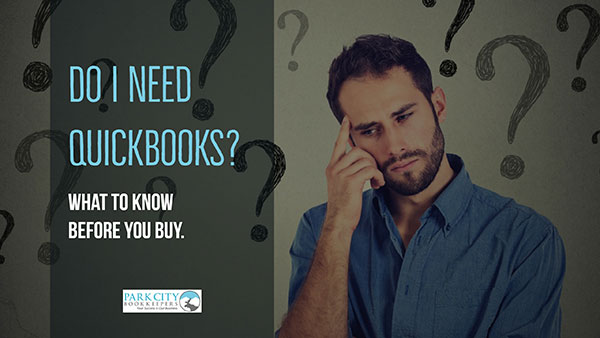As a small or medium-scale business, when your transaction volume grows, you may feel the need to invest in an accounting software, one of the most popular options is QuickBooks. However, QuickBooks comes with a lot of features that you may not need, and there are other less expensive options you might want to consider if this is the case. If you are currently asking yourself, “do I need QuickBooks?” this article should help you decide.
QuickBooks is a high-end accounting/bookkeeping software that many businesses around the world use and trust. Their software facilitates accounting and bookkeeping activities by providing a user-friendly interface and removes the need for unnecessary and tedious manual entries.
Do I need QuickBooks? To answer that question, look through the following areas. Do you struggle with any of the below items?
- Keeping accurate tabs on your revenue and expenses, which is essential for filing your tax returns.
- Recording details of financial transactions such as bank transfers/withdrawals, credit card expenditure, loans and so on.
- Automate your invoicing with professional looking invoices, emailed directly to customers.
- Allowing customers to pay directly into your bank accounts.
- Entering bills and print checks with.
- Monitoring any outstanding items and due dates.
- Preparing payroll for each period.
- Remembering upcoming tax payment due dates as well as reminders for quarterly reports.
- Maintaining details for important business contacts, such as customers, vendors and employees.
- Storing PDF files of any supporting documents such as copies of bills, invoices and so on.
- Attaching supporting documents to the relevant transactions and keep entirely digital records.
- Creating highly customized reports.
- Allowing employees to track and recording reports and record billable hours.
How many of the above areas need improvement?
There are several other useful features in QuickBooks and we will not be able to cover everything here; however, QuickBooks is one of the top choices when it comes to accounting/bookkeeping software for both small and large businesses.
This still may not answer the question, ‘Do I need QuickBooks?’
If you are still indecisive about whether you need QuickBooks, here are some scenarios where a business owner might not need to get the software:
#1. You run a very small business
If you are just starting out, and do not have a very large number of employees, you might not need the high level of functionality that QuickBooks provides. Initially, you could get by using Excel sheets or even any of the free bookkeeping software available online.
#2. You have full-time bookkeeping staff
QuickBooks offers a lot of features which simplify the process of bookkeeping and accounting, particularly making it easy for people who lack a technical background in bookkeeping/accounting to perform certain tasks. If you already have full-time bookkeepers or accountants working for you, you might not need the extra expense of purchasing QuickBooks, or some of its add-ons.
#3. You run a service oriented-business or consultancy
Typically, such businesses may not require technical accounting services since they usually have a very employee count, few incoming bills and little or no inventory/stock, etc. The bookkeeping needs for a consultancy or service-oriented small business may not justify the recurring expense of using QuickBooks.
If you answered yes to, ‘Do I need QuickBooks?’ Here are alternative options:
Microsoft Excel
Excel sheets and other spreadsheet programs are useful tools that small businesses can use to record and organize data. While the more complex your operation gets, the less suitable Excel will be, but for smaller businesses, it’s a viable option, and you can download many free templates online.
Free bookkeeping solutions
As mentioned earlier, there are quite a few free bookkeeping apps that might be more suitable for small business bookkeeping than QuickBooks. One example is Wave, which offers a good number of the functions and services that QuickBooks does, such as record-keeping, tax preparation and report making.
Manual Accounting
You do not necessarily need to make the switch to digital accounting, particularly if you run a small business. Manual account using paper ledgers and books is still a viable option that has its own advantages. For example, with manual bookkeeping, you do not have to worry about digital security or losing your data if your computer crashes. You can also easily take your books home with you if you would like to work remotely, not to mention the fact that it is way cheaper to do your bookkeeping this way.
Overall, the choice of whether to use a manual bookkeeping system, a free online solution or pay for a premium software like QuickBooks, really depends on your particular business needs.

